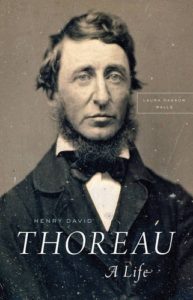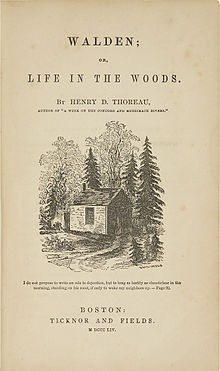
There seem to be a thousand things on the "David do" list these days (thankfully Ruth doesn't "honey do"!) and I'm finding my way through them, slowly but surely. Retirement is affording me more time for reading, both fiction and non-fiction. I have several books on the go, including an acclaimed biography of Henry David Thoreau. The release of Henry David Thoreau: A Life by Laura Darrow Walls was nicely timed to coincide with the 200th anniversary of this American icon's birth, and it has received glowing reviews.
I must confess that I have never been drawn to Thoreau, nor his legendary sojourn at Walden Pond, nor the Transcendentalist movement of which he was an integral part. Thoreau built a little cabin by the pond which was near his hometown of Concord, Massachusetts. He lived there for two years, two months, and two days, reflecting on the importance of solitude and nature. His goal was to write a book about an adventure with his beloved brother John, who died young. He did write that book, but he also penned another, based on his journal writing, and it was the enduring Walden; or Life in the Woods, both a musing and a manifesto for Transcendentalist principles. He certainly wasn't in the wilderness -- he walked to town most days for work -- but it touched the hearts and minds of many in his time and to the present day.

Thoreau attempted to live the notion of the inherent goodness of people and nature, and was a challenge to the intellectualism and rigid religious practices of the day. The goal was to be self-reliant and independent. In some respects Thoreau was successful and became the high profile spokesperson of a rather quixotic movement where there were many spectacular failures in communal and independent living.
I've appreciated learning that Thoreau was a keen student of the bible, despite his criticisms, and that he read the sacred texts of other religions with openness and respect. He was a fervent abolitionist, taking personal risks in aiding slaves on the Underground Railroad. He and John started a school where there was no corporal punishment, which was a regular part of discipline in the education system of the time. He had deep respect for the Native peoples who had inhabited the region and was keenly aware of the injustices perpetrated against them.
Thoreau actually coined the phrase "civil disobedience" as the title of an essay calling for resistance to government injustices. He and his family were strongly opposed to the annexation of Mexican states by force and he refused to pay a poll tax as a public protest. This action landed him in jail, briefly, and he was annoyed when someone paid the tax on his behalf to secure his release.
His family spent time in the natural world often and this was a life-long love for him. His interaction with creatures while at Walden became mythological, making him into something of an American St. Francis. While much of this is suspect in terms of historical accuracy, there is no doubt that Thoreau integrated a love and respect for nature into his spirituality.
Hey, I'm only halfway through the book! Do you know much about Thoreau? In many respects he had 21st century sensibilities in the early 19th century.
Thoughts?
My latest Groundling blog entry is only a click away! http://groundlingearthyheavenly.blogspot.ca/2017/08/reverence-monarch-project.html

No comments:
Post a Comment